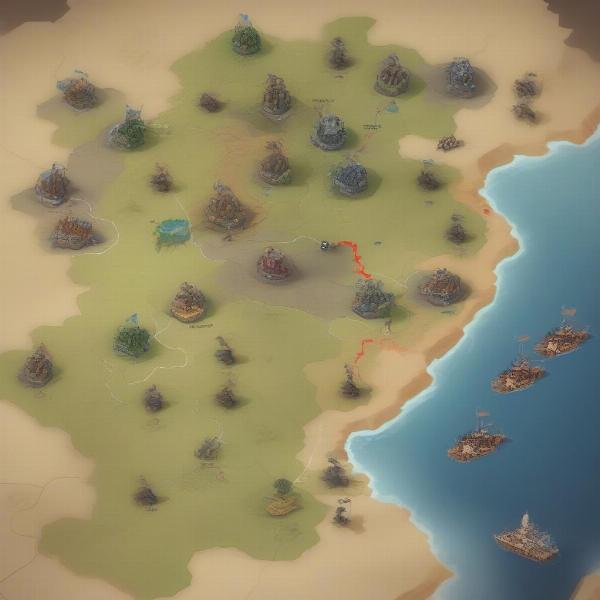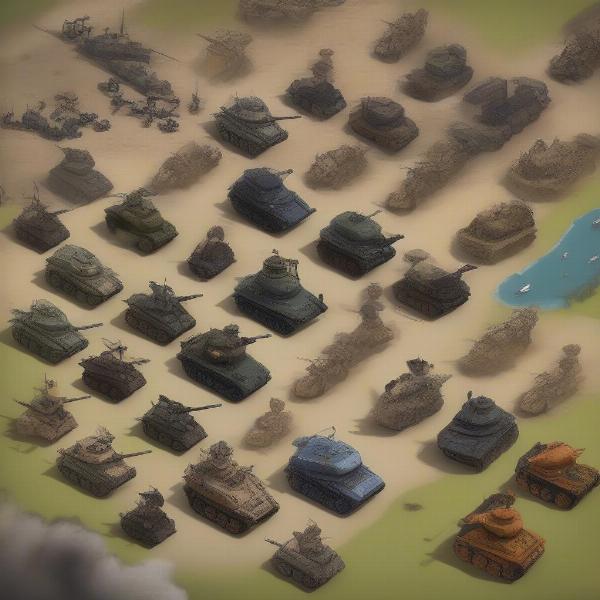Turn Based War Games offer a unique blend of strategic depth and tactical planning, captivating gamers with their thoughtful pace and intricate mechanics. At supremeduelist.blog, we delve into the heart of gaming to bring you insightful analysis, and this exploration of turn-based warfare is no exception. We’ll dissect what makes these games so compelling, highlighting key elements and exploring different subgenres. Whether you’re a seasoned armchair general or a curious newcomer, this guide will illuminate the nuances of this strategic gaming sphere.
In this comprehensive article, we’ll analyze the core elements that define a successful turn-based war game. From resource management and unit deployment to map awareness and long-term planning, we will dissect the different aspects that players must master to achieve victory. Furthermore, we will look at some of the most influential titles in this genre, discussing what makes each of them so significant and well-loved, with some links to related articles on supremeduelist.blog.
What Makes Turn Based War Games So Engaging?
The allure of turn-based war games lies in their thoughtful pacing. Unlike real-time strategy games, where split-second decisions can make or break a campaign, turn based war games demand careful consideration and foresight. Each turn is a new opportunity to adapt your strategy, assess your opponents’ moves, and maneuver your forces into advantageous positions. This creates a cerebral experience that rewards methodical planning and strategic thinking above all else. This is especially appealing to players who enjoy complex, strategic gameplay but don’t enjoy the stress of time pressures found in RTS games.
 strategic planning in turn based war games
strategic planning in turn based war games
Strategic planning is more than just moving units; it’s about anticipating your opponent’s actions and setting up long-term advantages. Players must master intricate skill trees, develop strong economies, and secure crucial resources to ensure a sustained campaign. In essence, the game board is a sandbox for meticulous players to execute their long-term plans, something that many other strategy game subgenres can’t offer. This strategic depth and the satisfaction of executing complex plans make these games incredibly engaging for many players.
Key Elements of Great Turn Based War Games
Several factors contribute to the enjoyment and replayability of turn-based war games. One of the most important is unit variety. A wide array of units, each with their own unique strengths and weaknesses, adds a crucial layer of depth to the game. Players must understand each unit’s role on the battlefield and how they interact with other units. The interplay between a sniper and a heavily armored unit, for example, creates a tactical puzzle each turn.
Another key element is map design. The terrain, size, and layout of the map can significantly impact strategic options. Open maps might favor mobile units, whereas tight maps require careful use of flanking maneuvers and defensive lines. Players need to learn to adapt to different maps and devise strategies that exploit the terrain’s features. Similar to [world war 2 turn based strategy games], the historical setting often influences the maps and the types of units available.
 varied units in turn based war games
varied units in turn based war games
Resource management is another significant aspect. Collecting and managing resources efficiently is crucial for building armies, researching upgrades, and sustaining military operations. This economic layer can be as important as tactical decisions on the battlefield. Players who can balance economic growth with military might often come out on top. This also encourages multiple playstyles, as focusing on different resources can enable players to develop entirely different unit compositions and strategies.
Exploring Subgenres within Turn Based War Games
The world of turn-based war games is surprisingly diverse. Several subgenres offer distinct experiences tailored to different player preferences. For instance, grand strategy games focus on controlling entire nations, managing economies, diplomacy, and military actions across vast maps. These games, often set in historical or fantastical settings, challenge players to balance numerous considerations. Titles in this category might feature large-scale wars but may not feature individual unit tactics in the way a smaller scale war game would.
On the other hand, tactical war games zoom in on battles, usually with a focus on individual unit management. Players maneuver squads of troops across detailed battlefields, employing cover, flanking maneuvers, and special abilities to achieve objectives. These games often feature intricate rulesets and demand precise decision-making, highlighting the importance of tactical planning in warfare. Similar to some aspects of [free turn based war games], tactical combat focuses more on individual battles than the grand strategy scale games.
 grand strategy turn based war games interface
grand strategy turn based war games interface
Finally, there are wargames with RPG elements which blend strategic gameplay with character development, skill trees, and narrative-driven campaigns. In these games, players might command a small band of heroes or a squad of named soldiers, making individual decisions matter just as much as battlefield strategy. This offers a more personal and often more engaging experience for players who prefer a narrative focus in addition to strategic depth. A similar type of experience can be found in games described in our article on [world war 2 rpg games].
Influence of History and Fiction
Many turn-based war games draw heavily from historical events and settings, like [world war 2 turn based strategy games]. This can help add a sense of realism and grounding to the game, while also offering a unique way to engage with historical events. These games often feature accurate weaponry, unit compositions, and strategic scenarios based on real battles. This level of historical accuracy can be incredibly appealing to fans of history. For example, games might try to replicate the tactical challenges of specific battles such as Stalingrad, or the strategies of historic leaders like Napoleon.
Conversely, other games embrace fantasy and science fiction worlds, creating fantastical settings with unique units, factions, and strategic possibilities. These games might use magic, advanced technology, or supernatural forces to add another layer to the gameplay. This allows designers to be more creative with gameplay mechanics and settings, appealing to players who want to be further away from the real world. This allows for a greater variety of different kinds of units, strategies, and worlds that wouldn’t be possible in a more realistic historical setting.
“The beauty of turn-based war games is that they allow for meticulous planning and analysis, which you don’t always get in real-time games,” said Dr. Alistair Finch, a game design expert. “This thoughtful pacing allows players to explore strategic depth without feeling rushed.”
Mastering the Art of Turn Based Warfare
To truly excel at turn based war games, a player needs more than just knowledge of the mechanics. A deep understanding of the metagame, or the ever-changing strategies employed by other players, is crucial. It’s often about understanding the optimal use of units and resources within a specific game environment. Players have to keep up to date on patch changes that can change the balance, and strategies must adapt to this changing environment.
Effective resource management is also paramount. Players need to balance investment in their economy, military, and research, and failing to do this can lead to vulnerabilities later in the game. Players often must decide between immediate military gains or long-term economic prosperity, and how they balance this risk and reward often decides the final outcome of the game. This can be a key factor in winning games, as a stronger economy can fund more powerful units.
 managing resources in turn based war games
managing resources in turn based war games
Furthermore, learning from your mistakes and studying your own game history is invaluable. Replaying past battles, understanding where you went wrong, and adapting your strategy accordingly is critical for improvement. Every game is a learning opportunity, and careful analysis of both your own play and that of others can help improve both strategy and play execution.
“The skill in these games lies not just in knowing the rules, but in understanding the complex interactions of units, terrain, and player behavior,” added Elara Vance, a professional gamer. “It’s a constant learning curve, which is why they are so endlessly engaging.”
Frequently Asked Questions About Turn Based War Games
What are the benefits of turn based war games over real time strategy games? Turn based war games offer more time for strategic planning, allowing players to think carefully about their moves without time pressure. This also gives time to study the game and understand the deep strategic mechanics. Real-time strategy often puts more pressure on the player, and may require a faster reaction time to play effectively.
What are some of the most popular turn based war games? Popular titles include the Civilization series, XCOM, and various strategy games from Paradox Interactive. The popularity of each of these franchises are testament to the quality and depth of gameplay that can be found in the genre. The unique mechanics and settings of each title has given each franchise a devoted fanbase.
Can turn based war games be multiplayer? Yes, many turn based war games offer both single-player and multiplayer modes, allowing players to test their strategies against human opponents. Some offer local multiplayer in a hotseat format, while others allow online play, with both direct and asynchronous gameplay. For those players who enjoy more competitive scenarios, multiplayer can offer a new and very challenging way to play the game.
Are turn based war games complex? While some are easy to pick up, many turn based war games have deep mechanics and can be complex to master. However, the learning process itself is often part of the appeal. Many games have extensive tutorials and other resources to help players learn the game mechanics, and there are large communities to ask for advice.
Final Thoughts on Turn Based War Games
Turn based war games offer a compelling blend of strategic depth, tactical decision-making, and meticulous planning, making them a truly rewarding experience for strategy game enthusiasts. Whether you enjoy the grand scale of empire management or the tight focus of squad-level combat, there is a turn based game out there for you. The deliberate pacing of these games allows for a level of strategic complexity and analysis that other game genres often lack, and is a key part of what makes this subgenre so appealing.
At supremeduelist.blog, we encourage you to explore the world of turn based strategy and see for yourself what makes this genre so special. Consider trying a new game, and keep checking the site for further articles on these and other games. Find out what games you may enjoy, and find a strategy that suits your own playstyle. Explore the vast worlds, diverse units, and deep mechanics, and see if you can master the art of turn-based warfare.
Leave a Reply